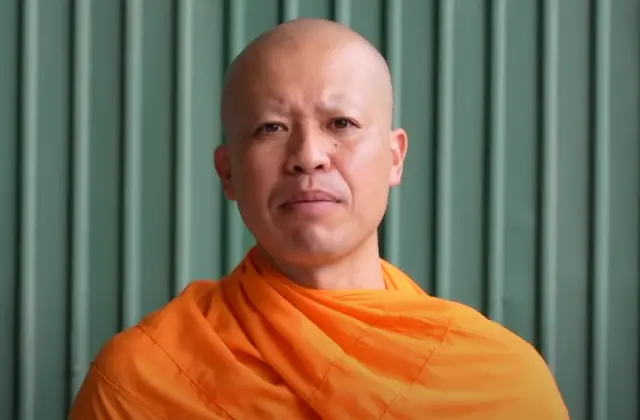
Nick Keomahavong
The coronavirus crisis and the immense amount of upheaval and change seen over the past year and a half has represented one of the most challenging times in recent human history.
But it also has become an opportunity for personal growth, and reevaluation on what has worked in our lives and what hasn’t.
Recently Nick Keomahavong, a former psychotherapist who was became a Theravada Buddhist monk in Thailand in 2018, sought out to understand how people have learned and grown since the crisis began by surveying hundreds of people around the world.
He took to his YouTube channel of over 105,000 subscribers to share the results in a video titled ‘This is Why You’re Unhappy.’
The following are the top ten lessons he discovered.
Lesson #1:
Put More Time and Effort Into Relationships
“About a year ago this month, I sent out a survey, to see because as a monk, as a person who had been involved in mental health before, I was just curious to see how COVID, this pandemic affected everyone,” Keomahavong said.
“It affected people’s mental health, it caused them suffering and grief, and I wanted to see how they were doing.
“And two, the question that I asked was, what did you learn from this experience? What wisdom did you pull out of this that you could use?”
Keomahavong says he surveyed hundreds of mental health professionals around the world, friends and family, and many different people from all walks of life, before compiling his list of the top 10 standout lessons.
First on the list was a simple yet highly important one: the importance of putting more time and effort into relationships.
“The first thing that really stood out and that blew everything out of the water was that people realized they needed to put time and effort into their relationships,” Keomahavong said.
“People said that this experience highlighted and exposed the fact that family, friends, relatives, children to them was so important, yet they did not make the time.
“During this time, they had to reconnect with their values, and the values for them was they wanted to spend quality time with their family; they wanted to make phone calls and connect even though they were not close to each other and they were living in different parts of the world.”
Keomahavong said that this response was the most common among the hundreds of people that he surveyed.
Family dinners, phone calls, and reconnecting with grandparents were among the focal points for those who responded.
Lesson#2:
Practice Self-Care
The phrase “self-care” has become ubiquitous in recent years, as practices like yoga, meditation, and nature walks have increased.
During the coronavirus situation, billions of people have had found themselves with more quiet time than at any point in recent memory.
Many have found new self-care practices and learned the importance of taking time out for one’s self, according to Keomahavong.
“Everyone wants to build a better future for themselves, they want to help other people, and they work a lot, and they pursue their goals which is a great thing.
“But in the process then, they realize that they haven’t been taking care of themselves.
“They’ve been investing so much time in the outside world, but again, this part of themself, they’ve neglected,” Keomahavong said.
“So people wanted to get back to taking care of their emotional health, they wanted to get back to taking care of their body, they’re realizing that they’re not even sleeping enough, exercising enough.
“This was the second answer that stood out.”
Lesson #3:
Slow Down
“This period exposed to us to how we’re always moving so fast,” Keomahavong said.
“We’re always trying to achieve things and to get more. And I noticed the things that I’ve been hearing are people saying things of productivity…Been when is it enough or when is it too much?”
Respondents told Keomahavong that they are “8xing,” “10xing,” or even “100xing” their productivity, or at least attempting to do so, he said.
While most of us will never experience the peace and stillness of being a monk, it’s important take time to truly savor and enjoy the little things in life, respondents said as part of this third coronavirus lesson.
Lesson #4:
Gratitude
“With the pandemic, people realized that they needed to be grateful for what they had,” Keomahavong said.
“And they had a lot to be appreciative of.”
People began to appreciate their jobs more as well as their support systems during the coronavirus crisis, including simple things like food on the table and the air in their lungs.
Studies have shown that being grateful for what you have and where you’re at in life is the number one trait of happy and successful people.
According to Dr. Robert Emmons, author of the book ‘Thanks!: How the New Science of Gratitutde Can Make You Happier,’ gratitude can increase levels of happiness by at least 25 percent.
Dr. Emmons’ conclusion was based on research involving thousands across the world.
Lesson #5:
Be More Present
“People are always on their phones,” Keomahavong said.
“You can be somewhere sitting next to someone at the same table having lunch, but mentally you’re not even there.”
“Again, I’m not here to judge your lifestyle, but this is just something people realize,” he added.
Respondents to the monk’s survey said that becoming more present and focused on life in the moment, rather than on the past, future, or the latest distraction, was a major lesson learned during the coronavirus crisis.
“Enjoy nature for nature, enjoy the people who you are with, and actually be fully present.
“This is something that many people reported that they learned.”
Watch Nick in the video below to learn the other five responses as well as his take on why so many people are unhappy nowadays:
Nick Keomahavong is the author of ‘The Buddhist Cleanse: The One-Day Spiritual Detox’ and the ‘I Love You Because’ book series.
Thanks for installing the Bottom of every post plugin by Corey Salzano. Contact me if you need custom WordPress plugins or website design.





